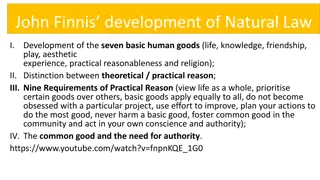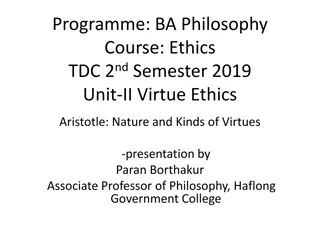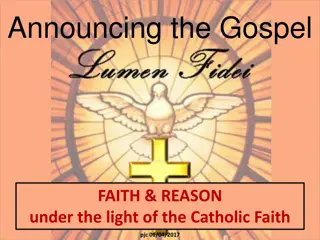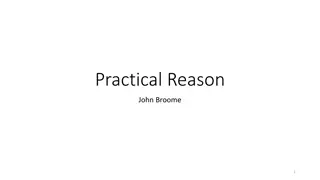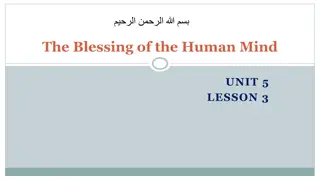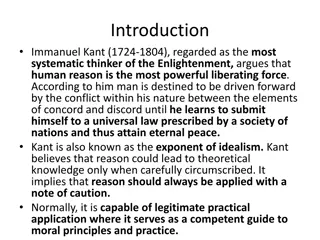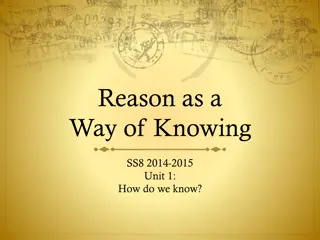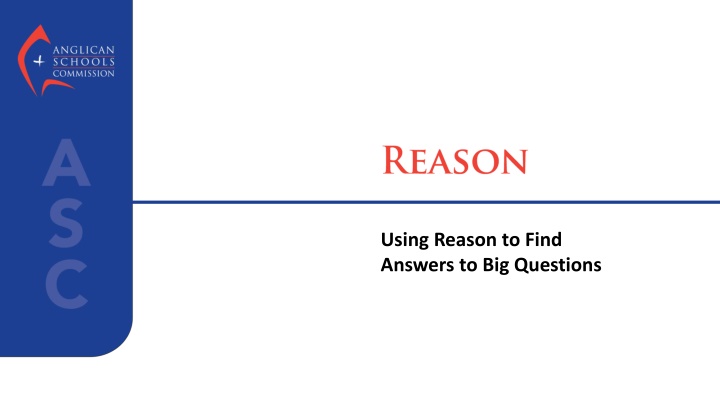
Using Reason to Explore Existence and Faith
Delve into the intersection of logic, belief, and philosophy through discussions on the nature of knowledge, arguments for the existence of God, and the eternal question of causality. Explore various perspectives, from the certainty of the sun rising to the mysteries that lead to faith in the divine.
Download Presentation

Please find below an Image/Link to download the presentation.
The content on the website is provided AS IS for your information and personal use only. It may not be sold, licensed, or shared on other websites without obtaining consent from the author. If you encounter any issues during the download, it is possible that the publisher has removed the file from their server.
You are allowed to download the files provided on this website for personal or commercial use, subject to the condition that they are used lawfully. All files are the property of their respective owners.
The content on the website is provided AS IS for your information and personal use only. It may not be sold, licensed, or shared on other websites without obtaining consent from the author.
E N D
Presentation Transcript
Using Reason to Find Answers to Big Questions
1.The sun rises everyday 2.The sun rose today 3.Therefore, the sun will rise tomorrow 1. Is this argument a good argument? Why/Why not? 2. Come up with your own example of this kind of logic
It is possible to know everything. Do you agree or disagree with this argument?
It is impossible to prove almost anything to 100% certainty. The real question is what is most likely? We can only make an argument about the sun rising tomorrow that is likely or possible (i.e. we are pretty sure the sun will rise tomorrow). Does this mean it s not true that the sun will rise tomorrow? Any argument concerning the existence of God, like the argument about the sun, can only result in a conclusion that is likely or probable. Does this mean God is not true?
What reasons do you think Christians have for believing in God? i.e. How does their logic connect with their faith? But for Anglicans, we also want to acknowledge that we cannot know everything, and we cannot know anything with 100% certainty. At some point we turn to mystery, and Anglicans see God here.
The following arguments are some that have been used to present evidence for the existence of God. Most of these are arguments from Philosophy.
Based on the premise that everything we observe has a cause The Big Bang is normally our answer to what caused the universe. We can then ask What caused the Big Bang? Theory of the multiverse: This kicks the can down the road. What caused the multiverse? We could keep going back forever. We could argue that the universe came from nothing for no reason We could argue that the universe is eternal and has always been We could argue that there is a uncaused cause e.g. God has always existed and has no beginning. As the eminent scientist Sir Arthur Eddington wrote the beginning of the universe seems to present insuperable difficulties unless we agree to look on it as frankly supernatural.
The world exhibits an order and improbability that is so high that it is extremely unlikely that the universe came into being by itself (intelligent design). The physicist P.C.W. Davies argues that the odds against the first conditions being suitable for stars to form (and planets and life) is 1 followed by at least a thousand billion billion zeros. If gravity were changed by 1/10+100 zeros life wouldn t have developed. There are about fifty constants and quantities (e.g. usable energy, mass difference between protons and neutrons, ration of forces of nature, proportion of matter to anti-matter) and all of these must be balanced to an infinitesimal degree for any life to be possible.
Author of The Chronicles of Narnia, C.S Lewis is the most well-known proponent of this argument. He argues that everyone has a sense of things being morally right and others being morally wrong If there is no God, how do we explain this?
God is a being than which none greater can be imagined (that is, the greatest possible being that can be imagined). God exists as an idea in the mind. A being that exists as an idea in the mind and in reality is greater than a being that exists only as an idea in the mind. Thus, if God exists only as an idea in the mind, then we can imagine something that is greater than God (that is, a greatest possible being that does exist). But we cannot imagine something that is greater than God (for it is a contradiction to suppose that we can imagine a being greater than the greatest possible being that can be imagined.) Therefore, God exists.
The vast majority of historians will agree on the basic outline of Jesus life as recorded in the gospels and many non-Christian sources: He was a 1st century Jew who lived in Nazareth. He travelled around teaching people about God and developed a reputation for performing miracles. He was crucified by the Roman Governor Pontius Pilate. Shortly after his death his followers claimed he rose from the dead and appeared to them. The real heart of the matter when it comes to Jesus is his resurrection. If it can be shown that Jesus did in fact rise from the dead, then Christianity has a great deal of merit. If it can be shown that he didn t then Christianity is entirely pointless. This is because all of the Christian hope of eternal life, forgiveness of sin, and the supernatural power of the God that Jesus called upon depend on the resurrection.
People see a God in the ordering of their lives. They see events turn in ways that they can only perceive as ordered and deliberate. While these experience arguments prove nothing, they do give some weight to the idea that being religious seems to be something that is natural, healthy and normal for human beings to be. If there is no God, why would we be like this?
What do you think this story from the Bible means? How can you use reason and logic to help you interpret it?
Later in Matthew 13 Jesus explains the Parable of the Sower Matthew 13:18-23 (CEV) 18Now listen to the meaning of the story about the farmer: 19The seeds that fell along the road are the people who hear the message about the kingdom, but don t understand it. Then the evil one comes and snatches the message from their hearts.20The seeds that fell on rocky ground are the people who gladly hear the message and accept it right away.21But they don t have deep roots, and they don t last very long. As soon as life gets hard or the message gets them in trouble, they give up. 22The seeds that fell among the thornbushes are also people who hear the message. But they start worrying about the needs of this life and are fooled by the desire to get rich. So the message gets choked out, and they never produce anything.23The seeds that fell on good ground are the people who hear and understand the message. They produce as much as a hundred or sixty or thirty times what was planted.







